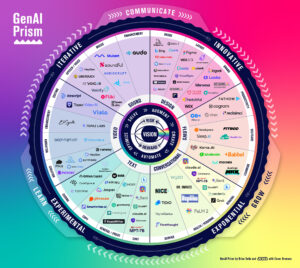I had a fantastic conversation with Frank Eliason (@comcastcares), Duncan Riley, and Chris Brogan last night during the Microsoft Windows Mobile Developer event (@WMDev) at Chapel in Seattle. We explored the drivers that propel companies into social labyrinths and how they participate, react and in turn, strategically plan (or should) once they’ve arrived.
The common motives are spurred through innovation (rare) and urgency (more common).
It’s Aha vs. Uh-oh…
However, the debate from within will eventually arise, questioning who owns social and how do we organize resources, time, technology, processes, and budget to support it.
Truthfully, many departments (not all, not most), will be forced to socialize and therefore require social programs at the departmental level managed by a centralized group (that most likely managers other factions of branding or communications concurrently).
In the meantime, it’s utter chaos and social anarchy within…just look at the disjointed efforts of even the best brands engaging online and their discontinuous and fragmented use of social networks that only muddle and dilute branding efforts and existing equity and resonance.
You ask, “Who owns Social Media?”
Is it PR, Marketing, Advertising, Service?
The answer is clear, your customers and influencers own & define it. And, without guidance or participation, they steer the impression and perception of your brand. Social CRM is much more than engagement strategies and tactics however, it requires a completely revamped infrastructure to support effective socialized relationships management through technology and resources.
While I may throw everyone a curveball when it comes to my SXSW plans, I do quietly have a panel on the SXSW panel picker with Damien Basile that I think will serve as one of the more intelligent, educational, and rewarding discussions during the event, i.e. getting out of the echo chamber and helping real businesses learn real techniques and processes to streamline and expand.
Social CRM: Managing Conversations to Protect/Shape Brands
Questions to Answer:
– What is Social CRM and how is it different than CRM or CRM 2.0?
– Who owns the conversation? Who is responsible for sCRM if Social Media is cluttering the internal marketing landscape (PR, Marketing, Interactive)?
– How is the infrastructure of CRM adapting to incorporate the “now” or real-time web?
– What are the new roles required for sCRM?
– What are the advantages and disadvantages of offshoring vs. nearshoring?
– How does an organization justify the less costly form of inbound-focused customer service to outbound CRM and ORM?
– Is there value in engaging everyone on the social web?
– How can companies change and adapt internally to reduce the negative chatter, thus reducing required responses?
– How should a brand manage a crisis about them in social media?
– How much transparency does a brand need to have in social media in respect to government agency regulations?
Description:
An in-depth discussion of how social media networks & tools like Twitter, Facebook, LinkedIn and blogs are important to brand customer relationship management. Who should be heading up these efforts, what rules they need to abide by and what companies are getting it right/wrong will be looked into. In the social Web, a brand’s perception reputation is in the hands of the new influencers – those customers, peers, and prospects who leverage social media to voice their views, opinions, and questions. It’s how you discover and engage in these discussions that determine the brand’s resonance.
While you’re there, here are 35 other panels that are worthy of your vote and attention (published by Jennifer Leggio on ZDNet @mediaphyter)
Connect with Brian Solis on:Twitter, FriendFeed, LinkedIn, Tumblr, Plaxo, Plurk, Identi.ca, BackType, Posterous, or Facebook
—
Kindle users, subscribe to PR 2.0 here.
—
Now available (click to purchase):
—
pr pr+2.0 pr2.0 public+relations marketing advertising interactive social+media socialmedia brian+solis social media media2.0 media+2.0 2.0 smo social+media+optimization marcom communication publicity advertising expert interactive spin brand branding guru social+architect








This question of “who owns social media” is to me obsolete. It’s like asking who owns email or wireless calls.
Different people in different organisations within a corporation will have to immerse themselves ( as a workgroup) in communities and conversations. There are some requirements around consitency, brand image, capitalization of the activity from different people within the same company, training on messaging … but the ultimate ownership is distributed and start , as you point out from the outside in.
I believe naming social media as a “media” is misleading.
There is no such a thing as social media, there are communities and social ecosystems and from a marketing standpoint, what is really at stake is how companies engage with these different communities wherever they hang out (from Facebook to twitter to blog to real life).
Best
With respect, Dominique, while I do totally understand your perspective (as someone deeply steeped in social media up to the roots of her hair daily, I get the “obsolete” thing) I actually agree with Brian that it’s a question that still needs to be addressed. Even though the numbers of people aware of and engaging with social media are increasing every day and at a rapid clip, deep use or even moderate use of these technologies/platforms still lies largely with the early adopter side of the room … This is changing, yes, and there are certainly more advanced discussions that should be happening… but they need to happen, in my opinion, in *parallel* with the continued outreach and education of those who are still just arriving at the party.
The content creator owns the social media they create… as far as they can carry it.
If you need someone else to carry it for you, Twitter, Facebook, FriendFeed, YouTube, you hand over a certain amount of your “rights” via their ToS (Terms of Service). If you can distribute your video to a million people, more power to you. If you can’t, and that’s what you aspire to, you’re going to have to make an affiliation with a distributor, and since they’re not charging you actual money, you’re going to give up a percentage of your ownership of the material.
If you uplad a video to Facebook, they don’t even show you how many people have watched it. How could they do that to you if they didn’t own a percentage of YOUR media? So, basically, it’s up to you.. Own 100% of your media and distribute it yourself or give up a percentage of your rights for the big players to allow you on the field and into the limelight.
It’s like asking who owns the internet, Brian.
/kaffee
Some interesting insights into how US organisations are currently managing social media can be found in a recent survey: http://bit.ly/FN1vb such as “Public relations leads the deployment of digital communications at 51 percent of organizations, while marketing takes charge 40.5 percent of the time. Specifically, the study found that public relations manages the use of blogging, (49 percent to marketing’s 22 percent), microblogging (52 percent to 22 percent) and social networking (48 percent to 27 percent).” And for how the survey was conducted, Arthur Yann (VP or PRSA), gives a summary here: http://bit.ly/2GyVVj
Brian,
Some interesting points and important questions for the industry.
I posted my thoughts on my blog: http://michaeljcooper.squarespace.com/michaeljcoopercouk/2009/7/6/you-cant-own-social-media.html
As you said, customers and influencers steer the perception of a brand today, but so does every employee.
A major problem is the corporate organization, which is often set up to control inside what can’t be controlled outside anymore. A fundamental change in corporate attitude and organization focussing on empowerement is necessary. Trust is imperative for that to happen.
Great conversation around this topic. Here is a post i read earlier this morning about “who” http://www.downtheavenue.com/2009/08/advertising-marketing-and-pr-suck-now-what.html
I think the approach to have each department engaged with a central team that manages it all makes sense for large organizations. Smaller org’s or nonprofits might not be able to afford this model so one person running the show or being the owner might be the best bet.
http://twitter.com/franswaa
Nice post, can’t wait to read more about this topic. Personally I would love to see some organizational charts from companies practicing social media. Also social media guidelines best practices would be nice here.